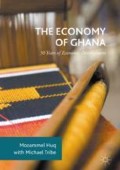Abstract
While issues of resource allocation are important as regards to economic growth, how income is distributed among the people is also a matter of concern. In particular, following the period of the Millennium Development Goals (MDGs) which ended in 2015, the UN has now adopted a new set of agenda called the “Sustainable Development Goals (SDGs)” to be achieved during the years 2015–2030, specifically aiming to end poverty, protect the planet and ensure prosperity for all as part of a new development initiative. Each of the 17 goals adopted identifies a specific target to be achieved over the next 15 years. While the UN expects everyone including governments, the private sector and civil society to play their part in achieving these goals, there is a particular pressure on the governments of developing countries, especially those with high levels of poverty, to deal seriously with the issues of poverty and income distribution.
Notes
- 1.
For the complete list of SDGs please refer to the United Nations report (UN 2017). The main SDGs are:
-
1.
End poverty in all its forms everywhere;
-
2.
End hunger, achieve food security and improved nutrition and promote sustainable agriculture;
-
3.
Ensure healthy lives and promote wellbeing for all at all ages;
-
4.
Ensure inclusive and equitable quality education and promote lifelong learning opportunities for all potential;
-
5.
Achieve gender equality and empower all women and girls;
-
6.
Ensure availability and sustainable management of water and sanitation for all;
-
7.
Ensure access to affordable, reliable, sustainable and modern energy for all;
-
8.
Promote sustained, inclusive and sustainable economic growth, full and productive employment and decent work for all;
-
9.
Build resilient infrastructure, promote inclusive and sustainable industrialisation and foster innovation;
-
10.
Reduce inequality within and among countries;
-
11.
Make cities and human settlements inclusive, safe, resilient and sustainable;
-
12.
Ensure sustainable consumption and production patterns;
-
13.
Take urgent action to combat climate change and its impacts;
-
14.
Conserve and sustainably use the oceans, seas and marine resources for sustainable development;
-
15.
Protect, restore and promote sustainable use of terrestrial ecosystems, sustainably manage forests, combat desertification, and halt and reverse land degradation and halt biodiversity loss;
-
16.
Promote peaceful and inclusive societies for sustainable development, provide access to justice for all and build effective, accountable and inclusive institutions at all levels; and
-
17.
Strengthen the means of implementation and revitalise the global partnership for sustainable development.
-
1.
- 2.
The recent figures apply to 2013.
- 3.
The generalised entropy index [GE(2)] is one of the measures for estimating inequality matrices as special cases.
Bibliography
Adjasi, C. K. D., & Osei, K. A. (2007). Poverty Profile and Correlates of Poverty in Ghana. International Journal of Social Economics, 34, 449–471.
Cooke, E., Hague, S., & McKay, A. (2016). The Ghana Poverty and Inequality Report: Using the 6th Ghana Living Standards Survey (Jointly by University of Sussex and Asheshi University College). New York: UNICEF.
GSS. (2007). Patterns and Trends of Poverty in Ghana 1991–2006. Accra: Ghana Statistical Service.
GSS. (2014c). Ghana Living Standards Survey Round 6 (GLSS6): Poverty Profile in Ghana (2005–2013). Accra: Ghana Statistical Service.
UN. (2017). The Sustainable Development Goals Report 2017. New York: United Nations.
Author information
Authors and Affiliations
Copyright information
© 2018 The Author(s)
About this chapter
Cite this chapter
Huq, M., Tribe, M. (2018). Poverty and Inequality. In: The Economy of Ghana. Palgrave Macmillan, London. https://doi.org/10.1057/978-1-137-60243-5_19
Download citation
DOI: https://doi.org/10.1057/978-1-137-60243-5_19
Published:
Publisher Name: Palgrave Macmillan, London
Print ISBN: 978-1-137-60242-8
Online ISBN: 978-1-137-60243-5
eBook Packages: Economics and FinanceEconomics and Finance (R0)

